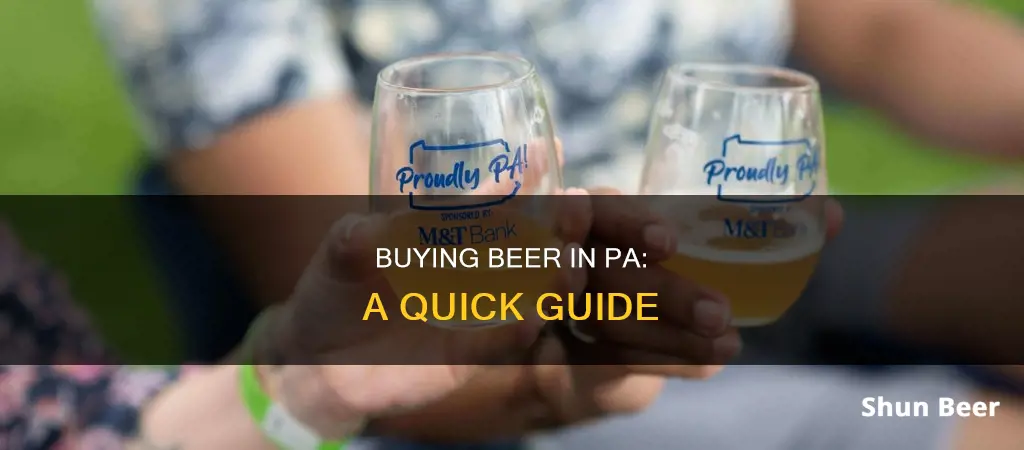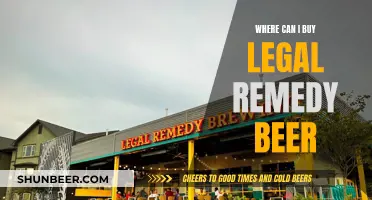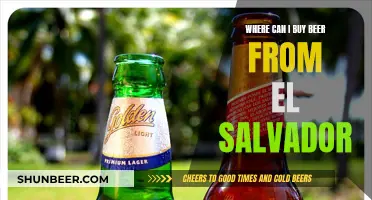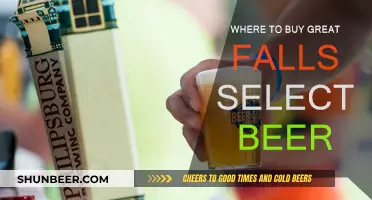
Pennsylvania's liquor laws are notoriously confusing, and the state's alcohol regulations are considered some of the strictest in the US. The state's complex alcohol laws can be traced back to the Prohibition era and the influence of Gifford Pinchot, who served as governor from 1923 to 1935. Pinchot was a dry advocate and maintained a tough stance on alcohol control even after Prohibition was repealed during his second term. As a result, Pennsylvania's alcohol laws have some peculiarities not found in other states. For example, there are different types of liquor licenses, and establishments must adhere to specific rules and restrictions based on their license type. So, if you're looking to buy beer in Pennsylvania, here's what you need to know:
Beer distributors have the fewest restrictions and can sell kegs, cases, and 12-packs. Since 2016, they can also sell six-packs, single bottles, and growlers. However, beer purchased from distributors is for off-premise consumption, meaning you can't drink it on-site. On the other hand, bottle shops, grocery and convenience stores, and bars can obtain a license to sell up to 192 fluid ounces of beer per transaction (equivalent to 12 16-ounce cans). Licensed breweries can sell beer for on-site or off-site consumption and may also offer products from other Pennsylvania-licensed producers for on-site consumption. Additionally, some supermarkets and convenience stores are acquiring licenses to sell beer and wine, thanks to recent legislation that relaxed the state's liquor laws. These stores include Giant Food Stores, Rutter's Farm Stores, Sheetz, and Weis Markets.
| Characteristics | Values |
|---|---|
| Places to buy beer | Beer distributors, bottle shops, bars, grocery stores, breweries, convenience stores, supermarkets, pubs, online |
| Amount of beer that can be purchased | Up to 192 fluid ounces of beer per transaction (equivalent to 12 16-ounce cans) |
| Beer for on-site consumption | Licensed breweries, bars, restaurants, pubs |
| Beer for off-site consumption | Beer distributors, bottle shops, grocery stores, convenience stores, supermarkets |
| Beer delivery services | GoPuff, Quick Sip Delivery, Tavour |
| Beer in grocery stores | Giant, Acme, Martin's, Wegmans, Whole Foods, Mom's Organic Market, Turkey Hill Minit Markets, Rutter's Farm Stores, Sheetz, Wawa |
| Beer in convenience stores | 7-11, Wawa, CVS, Royal Farms, Rutter's, Turkey Hill, Sheetz |
What You'll Learn

Where to buy beer in Pa
Pennsylvania's liquor laws are some of the most restrictive in the United States, and can be traced back to the Prohibition era. The state's complex alcohol laws have been influenced by the "dry" stance of Gifford Pinchot, who served as governor from 1923 to 1935. Pinchot believed that state control was the best way to prevent corruption in the alcohol industry. As a result, the Pennsylvania Liquor Control Board was established to license establishments, regulate prices, and set serving hours.
So, where can you buy beer in Pennsylvania?
Malt beverages, such as beer, hard seltzer, and cider, are widely available in Pennsylvania. Beer distributors, bottle shops, bars, grocery stores, and breweries can all sell these beverages. The amount they can sell, however, depends on the type of license they hold.
Beer distributors have the fewest restrictions and can sell kegs, cases, and 12-packs. Since 2016, they have also been permitted to sell six-packs, single bottles, and growlers. It is important to note that beer purchased from distributors is for "off-premise consumption" only.
On the other hand, bottle shops, grocery and convenience stores, bars, and other licensed establishments can sell up to 192 fluid ounces of beer per transaction (equivalent to 12 16-ounce cans). This allows for both on-site consumption and takeaway.
Licensed breweries offer an even more extensive range, selling beer for on-site consumption or takeaway, as well as products from other Pennsylvania-licensed producers for on-site consumption.
Additionally, beer can be delivered to your home or business by many breweries, or through delivery services like GoPuff and Quick Sip Delivery. Out-of-state beer shipping services, such as Tavour, can also deliver up to 192 fluid ounces of beer per month.
When it comes to purchasing beer in Pennsylvania, it's important to keep in mind that the laws and regulations are complex and may vary from establishment to establishment. The Pennsylvania Liquor Control Board and its licensing system play a significant role in determining where and how much beer can be sold.
Buying Beer Late at Night in Tennessee
You may want to see also

How much beer can be purchased at once
The amount of beer you can purchase at once in Pennsylvania depends on the type of license the vendor has.
Distributor (D) License
Beer distributors have the fewest restrictions. They can sell you kegs and cases, 12-packs, six-packs, single bottles, and growlers. Distributors are authorized to sell beer in any package configuration to an unlicensed customer. However, these sales are for "off-premise consumption," meaning you can't buy beer at the store and drink it there, too.
Bottle Shops, Grocery and Convenience Stores, Bars, and Other Places
These vendors can get a license to sell up to 192 fluid ounces of beer per transaction (the equivalent of 12 16-ounce cans). You can buy more, but you'll have to make a different trip for each transaction. You can drink it there or take it to go.
Licensed Breweries
Licensed breweries can sell you beer to drink there or to go, or products from other Pennsylvania-licensed producers to drink there.
Shipping and Delivery
You can also have beer shipped or delivered to your home or business. Many breweries offer local delivery or can ship to addresses in the state. You'll need to have someone 21 or older present when it arrives. Out-of-state beer shipping services, such as Tavour, can send you up to 192 fluid ounces of beer per month.
Where to Buy Lost Colony Beer in Stores
You may want to see also

Beer for on-site consumption
Pennsylvania's alcohol laws are notoriously complex and strict, dating back to the Prohibition era and the "dry" stance of Gifford Pinchot, who served as governor from 1923 to 1935. The Pennsylvania Liquor Control Board was created to regulate the industry, including licensing establishments, setting serving hours, and determining prices.
If you're looking to buy beer for on-site consumption in Pennsylvania, here are some options:
Bars and Restaurants:
- Bars and restaurants with the appropriate licenses can sell beer for on-site consumption. This includes both casual bars and licensed breweries.
- These establishments can sell up to 192 fluid ounces of beer per transaction, equivalent to 12 16-ounce cans.
- Serving hours for on-site consumption are typically from 7:00 am to 2:00 am Monday through Saturday and from 11:00 am to 2:00 am on Sundays, provided they have a Sunday Sales Permit.
Hotels:
- Hotels with an H liquor license can sell beer for on-site consumption.
- Similar to restaurants, they can sell up to 192 fluid ounces of beer for on-site consumption.
- Hotels with a Wine Expanded Permit can also sell up to four 750 mL bottles of wine "to go."
- Serving hours are generally the same as for restaurants, from 7:00 am to 2:00 am Monday through Saturday, and with a Sunday Sales Permit, from 9:00 am on Sunday to 2:00 am on Monday.
Clubs:
- Private clubs with a Club (C) or Catering Club (CC) liquor license can sell alcohol to their members and, in the case of catering clubs, to non-members as part of a catered event.
- Alcohol sales must be secondary to the club's primary purpose, and the club must adhere to specific operating guidelines.
- Sales and service of alcohol can begin as early as 7:00 am and must end by 3:00 am, with patrons departing by 3:30 am.
Licensed Breweries:
- Licensed breweries can sell beer for on-site consumption and also offer products from other Pennsylvania-licensed producers for on-site consumption.
- They can operate Monday through Saturday from 9:00 am to midnight and on Sundays from 9:00 am to 11:00 pm.
Convenience Stores and Supermarkets:
- Some convenience store chains, such as Royal Farms, Rutter's, Sheetz, Turkey Hill, and Wawa, sell beer at select locations for on-site consumption.
- Supermarkets with attached restaurants can also sell beer, but they must meet specific conditions, including a defined separation from the supermarket, a separate cashier, and seating for at least 30 patrons.
- These establishments typically follow similar serving hours and quantity restrictions as bars and restaurants.
Vermont's Beer-to-Go Laws: Can You Buy Cans?
You may want to see also

Beer for off-site consumption
Firstly, retail establishments selling alcohol must be licensed. There are different types of licenses available, including distributor licenses, which are for establishments selling larger quantities of beer, typically cases and kegs, for off-site consumption. Distributor (D) licenses are commonly held by neighbourhood beer distributors. These licensees can sell beer in any package configuration to an unlicensed customer for off-site consumption. This includes cases, 12-packs, six-packs, single bottles, and refillable and resealable growlers. Distributors may also sell beer in original containers of 128 fluid ounces or more, such as kegs.
D and ID (Importing Distributor) license holders may sell and/or deliver beer between 8:00 a.m. and 11:00 p.m. every day except Sunday. If a Sunday Sales Permit is obtained, sales to unlicensed persons and holders of Special Occasion Permits are permitted on Sundays between 9:00 a.m. and 9:00 p.m.
Other types of establishments, such as bottle shops, grocery and convenience stores, bars, and breweries, can obtain a license to sell smaller quantities of beer for off-site consumption. These places can sell up to 192 fluid ounces of beer (equivalent to 12 16-ounce cans) per transaction. This typically includes six-packs, twelve-packs, and individual bottles.
Pennsylvania's liquor laws have been gradually loosened in recent years, making it easier to buy beer for off-site consumption. For instance, since 2016, beer distributors have been allowed to sell six-packs and single bottles, whereas previously they were restricted to larger formats.
Buying Beer on Sundays in Mississippi: What's the Deal?
You may want to see also

Where to buy other alcoholic drinks in Pa
Pennsylvania's liquor laws are some of the most restrictive in the United States, and can be traced back to the Prohibition era. The state has strict regulations on where alcoholic drinks can be purchased, and in what quantities.
Where to Buy Alcoholic Drinks Other Than Beer in Pennsylvania
Spirits/Liquor
Spirits can only be purchased from state-owned Fine Wine & Good Spirits stores, which also sell wine but not beer. There are over 600 of these stores across Pennsylvania. They offer shipping to Pennsylvania addresses, and you can order online for delivery or pickup.
Pennsylvania distilleries can also sell liquor for on- or off-premises consumption, and some offer shipping and local delivery. These include Philadelphia Distilling, Art in the Age, New Liberty Distillery, and Bluebird Distilling.
Wine
Wine can be purchased from bottle shops, grocery stores, and local wineries. At bottle shops and grocery stores, you can buy up to three liters of wine per transaction (equivalent to four 750-milliliter bottles). Wineries licensed with the PLCB can ship up to 36 standard 9-liter cases of wine to your home for personal use.
Fine Wine & Good Spirits stores also offer shipping to Pennsylvania addresses, and you can order online for delivery or pickup.
Other Options
Several convenience store chains, such as Royal Farms, Rutter's, Sheetz, Turkey Hill, and Wawa, sell beer and wine at select locations. Additionally, many supermarkets have restaurants attached to the main supermarket building where they sell alcohol, but under very specific conditions.
Buying Beer on Election Day in New Mexico
You may want to see also
Frequently asked questions
Beer can be purchased from a variety of places, including beer distributors, bottle shops, bars, grocery stores, and breweries. The amount of beer that can be sold depends on the type of license the establishment has.
There are three main types of licenses: distributor, eating place (E) retail dispenser, and restaurant (R) liquor license. Distributor licenses allow the sale of beer for off-premises consumption only, while eating place and restaurant licenses permit on-premises consumption.
Yes, but it depends on the store. Some convenience stores and supermarkets have acquired licenses to sell beer and/or wine. For example, Sheetz, Rutter's, and Weis Markets are known to sell beer in some of their Pennsylvania locations. However, 7-11, Wawa, and CVS do not typically sell beer.







